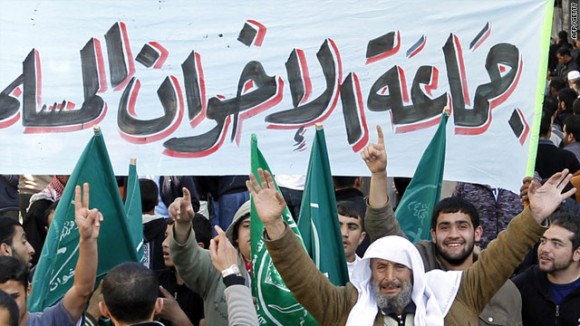
Freedom and Justice Party (FJP) Chairman Mohamed Morsy’s January 6 statement appears to have been written specifically to address foreign concerns about the party’s priorities. It is an interesting mix of issues that are genuine interests of the FJP (internal security reform, education, employment, equitable wages, housing) and those that seem geared toward the audience: listing “the principles of liberty and equality” as the top priority and discussing development of tourism as a “key component” in creating jobs, with no mention of morality concerns. The attempt to address women’s rights is a bit tortured; Morsy calls for “non-discrimination among citizens with regard to rights and duties on the basis of religion, sex, color, granting women all their rights – maintaining a balance between their rights and duties,” implicitly discriminating against women by suggesting that balancing rights and duties is a particular issue for them rather than for men.
Still, what is most interesting about the statement is what it does not say, that is, the almost complete silence on foreign and national security affairs. The very last priority listed is:
“Twelfth, deepening of cooperation with Arab countries: The FJP has stressed that it seeks to support plans and mechanisms for integration and joint Arab action in all areas, and emphasized the right of the Palestinian people to liberate their land and the right of peoples to obtain their rights and to have free will to govern themselves in the way they consider appropriate. The nation must truly be the source of authority and power.”
There is nothing direct about Israel, the United States, or—notably—the role of the military in the future Egyptian state, a very hot issue.
It seems the FJP is trying to keep its distance from all of these problems for the present, most likely in an effort to avoid provoking the ire of the SCAF or foreign powers, at least for now. Such a strategy would be of a piece with the remarkable discipline the FJP has shown over the last couple of months, keeping its volunteers focused on winning parliamentary elections while liberals and leftists spent themselves on anti-SCAF demonstrations in Tahrir and elsewhere. The FJP’s recent statement siding with the SCAF against nearly all of the non-Islamist political groups regarding prioritizing the writing of the constitution over a presidential election suggests this strategy might continue for some time. The FJP might well confront the SCAF, but will try to save that for an issue the FJP deems critical.
Regarding foreign affairs, the FJP is unlikely to stay silent for long, whatever it would like to do. Once the FJP has its plurality or perhaps even majority in parliament, it will start reacting more vociferously to actions by Israel, the United States, and others that provoke Egyptian public opinion. My former colleague, Nathan Brown, has an interesting paper coming out shortly that discusses the FJP’s foreign policy.
Michele Dunne is the director of the Rafik Hariri Center for the Middle East and an official observer of the first stage of the parliamentary elections. She can be reached at mdunne@acus.org.
Photo Credit: Getty
Image: t1larg.egypt_.muslim.brotherhood.afp_.getty_-e1322936628389.jpg


